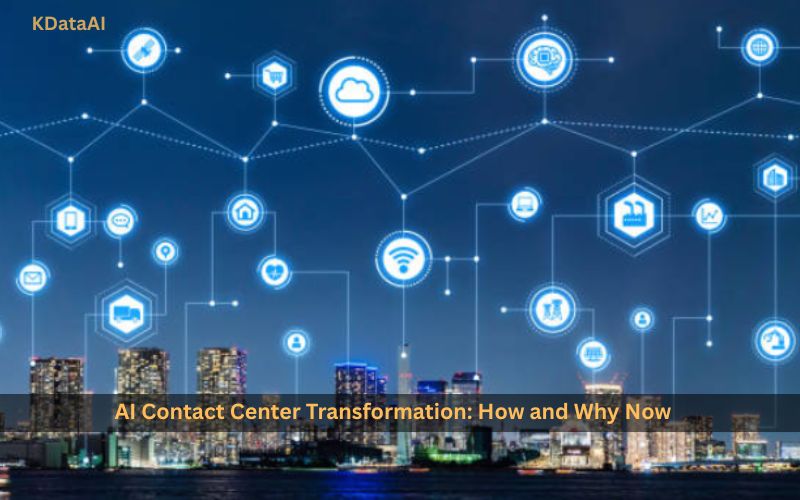
Artificial Intelligence (AI) is fundamentally transforming contact centers, reshaping both how organizations deliver customer service and how agents work. The shift is not just about adopting new technology, but about reimagining the entire customer experience, operational efficiency, and business growth.
How AI Is Transforming Contact Centers
- Enhanced Self-Service and Automation
AI-powered chatbots, virtual assistants, and advanced IVR systems now handle a significant share of routine inquiries, providing instant, accurate responses 24/7. This reduces customer wait times, deflects call volume from expensive voice channels to digital ones, and allows human agents to focus on complex, high-value interactions. - Personalized Customer Experiences
AI leverages customer data to deliver tailored interactions, anticipate needs, and resolve issues proactively. For example, AI can identify a customer’s issue before they articulate it and take steps to resolve it automatically, such as sending payment reminders or troubleshooting tips. - Empowering Agents
Rather than replacing agents, AI augments their roles. AI-driven tools summarize calls, automate post-call documentation, and surface relevant customer insights in real time. This reduces stress, improves agent productivity, and fosters a more rewarding work environment. - Operational Efficiency and Cost Reduction
AI streamlines workflows, reduces average handling times, and lowers operational costs. Organizations report significant reductions in cost per call and increased capacity to handle higher call volumes with fewer agents, while maintaining or improving customer satisfaction scores. - Actionable Insights and Business Intelligence
AI analyzes vast amounts of customer interaction data, uncovering trends and actionable insights that inform product development, marketing, and overall business strategy
Why Now?
- Rising Customer Expectations
Customers now demand instant, personalized, and seamless service across multiple channels. AI is essential for meeting these expectations at scale, ensuring businesses remain competitive. - Technological Maturity
Advances in generative AI, large language models (LLMs), and machine learning have made AI solutions more capable, reliable, and easier to integrate into existing contact center platforms. - Workforce Optimization
High agent turnover and the need for cost-effective operations make AI a strategic imperative. AI reduces repetitive workloads, improves agent satisfaction, and enables organizations to do more with less. - Business Growth and Differentiation
AI-driven contact centers are not just about cost savings—they unlock new opportunities for growth by enabling personalized, proactive customer engagement and supporting loyalty-driven KPIs.
Key Trends and the Road Ahead
- AI will increasingly operate behind the scenes, acting as a powerful co-worker for agents rather than a replacement.
- The most successful contact centers will balance automation with human empathy, ensuring AI handles routine tasks while humans manage nuanced, emotionally charged interactions.
- Security, compliance, and data privacy will become even more critical as AI handles sensitive customer information.
- Organizations that strategically blend AI with human expertise will set new standards for customer satisfaction and operational excellence.
AI is no longer optional for contact centers aiming to meet modern demands. The transformation is underway—and those who embrace it now are poised to lead in efficiency, customer loyalty, and innovation.
Main Benefits of Integrating AI in Contact Centers
- Enhanced Customer Experience
- AI reduces customer wait times by automating routine inquiries and providing instant responses through chatbots and virtual assistants, ensuring customers receive fast, consistent, and personalized support at any time.
- AI enables 24/7 support, allowing customers to get help outside of traditional business hours, which is critical for global businesses.
- Increased Operational Efficiency and Cost Savings
- By automating repetitive tasks such as data entry, call routing, and basic inquiries, AI frees up human agents to focus on complex or high-value interactions, thus improving productivity and reducing operational costs.
- AI-powered self-service options deflect calls from expensive voice channels to more affordable digital channels, further lowering labor and infrastructure costs.
- Improved Agent Performance and Engagement
- AI assists agents in real time with suggestions, sentiment analysis, and automated documentation, making it easier for them to resolve customer issues efficiently.
- Gamification and real-time coaching features can boost agent motivation, performance, and job satisfaction by providing feedback and rewards.
- Personalization and Predictive Insights
- AI analyzes customer data and past interactions to deliver tailored experiences, anticipate needs, and proactively resolve issues, leading to higher satisfaction and loyalty.
- Predictive analytics help businesses identify trends, forecast demand, and optimize resource allocation, improving both customer service and business outcomes.
- Scalability and Flexibility
- AI solutions can easily scale to handle spikes in call volumes without sacrificing service quality, making them ideal for seasonal peaks or rapid business growth.
- Intelligent routing ensures customers are directed to the best-suited agent or resource, minimizing hold times and improving first-contact resolution rates.
- Actionable Business Insights
- AI continuously analyzes interactions, providing real-time and historical insights into customer sentiment, agent performance, and operational bottlenecks, which can be used to refine strategies and offerings.
- Quality Monitoring and Compliance
- AI-powered quality monitoring tools can transcribe calls, detect sentiment, and flag compliance issues, helping maintain high service standards and regulatory adherence
Integrating AI into contact centers delivers measurable improvements in customer satisfaction, operational efficiency, agent engagement, and business intelligence—making it a strategic imperative for organizations aiming to excel in today’s customer-centric landscape.
